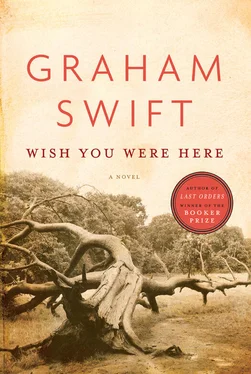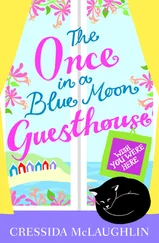For a while Clare actually contemplated having to tell her husband that she was very sorry, but she no longer felt — comfortable — at Jebb. But that, of course, would suggest that there really was something wrong with her, since no one else was having any problem. And how would Toby take it? Rich as he was, he’d spent more money than she cared to calculate on what might now become, thanks to her, a failed enterprise. And he’d doubtless choose to say that he’d really only done it all for her — because she’d got so gooey-eyed about it in the first place.
But he might also be — she knew her husband — rather witheringly pragmatic. It was his way with anything that went wrong. The facts were that he’d blown one year’s bonus to make the purchase, another year’s on the renovations. If they had to give up on the place (if she really felt like this) then it wouldn’t have broken the bank. (He was a banker.) And, the way prices had moved, they might still make a bit on the sale.
‘No permanent damage’, he might even say — though perhaps implying that she might be the one who was permanently damaged. What was the matter with her? And such magnanimity, she knew, might only be a convenient tactic. He could afford to be agreeable. In the early stages of the building work, Clare had come to realise that he was using their expensive project as a sort of shield for his ongoing affair with Martha, his PA (though in the time it took to finish the renovations she acquired some loftier status). It deflected attention from it — it quite often meant that Clare would be down there, with the children, when he wasn’t. But it was also a sort of pay-off. How could she complain, when he lavished so much on his family?
Clare even wondered if her moment — her ‘shiver’, as she would think of it — hadn’t really been to do with her suppressed recognition that the Martha thing wasn’t just a temporary toying (it had gone on and on like the building work), and that though they’d bought this solid and beautiful portion of countryside, her marriage was really a rather flimsy, unlovely affair. She pretended and even believed, most of the time, that this wasn’t so. For the sake of the children, of course, but also because she’d been given the bribe of this handsomely refurbished farmhouse in its splendid setting.
*
Fortunately, her ‘moment’ was isolated enough for none of these awful showdowns — with either her husband or herself — to occur. When Jack stood by the gate, the Robinsons still possessed Jebb Farmhouse, though they were not in residence at the time. Toby and Clare remained married (though the Martha thing still went on). The three children — and there had only been two when the purchase was made — had now enjoyed several happy summers at Jebb. So had their parents.
Clare, masking her feelings, had been pragmatic in her way too. Before making any foolish announcements, she’d waited for a recurrence of her ‘shiver’. None had come, which perhaps indicated it was all a nonsense in the first place. Time had passed and, in the absence of any further symptoms, she’d almost been able, until very recently, to forget her temporary, perhaps imaginary disease.
And what she’d experienced recently wasn’t really like that first shiver at all. It was, in the first instance, only a letter, an unopened letter, that had nothing to do with her. They’d been at Jebb during the children’s half-term break. It had coincided with Guy Fawkes’ Night and Toby had made quite a thing of the fireworks. Then a letter had arrived, which only she had noticed and which she’d quickly redirected. They received very little mail at Jebb and, by now, virtually nothing relating to the former occupant, but the letter had borne the name Luxton and also the words ‘Ministry of Defence’.
She’d wondered what the connection could possibly be with a now long-defunct farm, but she’d felt conscientiously impelled to see that it was forwarded at once. She’d crossed out the address, written in the one they still had for the Isle of Wight (assuming it still applied) and, on the pretext of some other errand, driven straight up to Marleston to re-post it. Perhaps it was more a case of wanting it, for some curious reason, out of the way as soon as possible and it was almost a relief when she dropped it in the village box. No one else knew about it.
Then only days later, back in Richmond, she’d glanced at a newspaper and spotted a name and a face, and this time felt a true shiver. The name was Luxton again, and the face was even faintly familiar, though it plainly wasn’t the face of a farmer. For a while the cold sensation had concentrated in her hand.
She wished at once that she’d never seen the item in the paper. So often, you looked at a newspaper without noticing half of what was there, and what you don’t see can’t trouble you. But she’d seen it. And now she wondered what she should do about it. Though there was nothing, really, that could be done about it.
But she felt distinctly disturbed. She felt that at least she should mention it to Toby. Had he noticed it — and drawn the same conclusion? But she knew that if she did mention it, he would say he hadn’t noticed, or hadn’t remembered the name, whether he actually had or not. And she knew that if she spelt it out for him (let alone mentioned the redirected letter) he would simply shrug. So what? He might even look at her as if she were behaving pretty strangely.
The Robinsons, as Jack recalled, had been very concerned about ‘security’ (it was one of their words), and solid evidence of their concern was that heavy white gate with its built-in electronic features. ‘Control of Entry’, Jack had momentarily thought. But the Robinsons had reflected that while a gate that couldn’t be opened might deter intruders in a vehicle, it was no barrier to intruders on foot. In such an event — and assuming the intruders would trip the alarms in the house and grounds — it was important, when the Robinsons were not in residence, that the police could get through the gate and so catch the thieves red-handed.
So it was that Sergeant Ireton, as well as the Robinsons, possessed the means to open the Jebb gate, and thus he might technically have found himself — had Jack decided, that morning, on some impromptu intruding himself — in the position of arresting the man who, minutes before, he’d, so to speak, shared a coffin with. Though it was also possible that if Jack had actually asked whether there was any way he might take a quick look at Jebb, Bob might have said, ‘Of course. I can open the gate for you. I even know how to cut out the alarms.’
Security, in the broad sense — security of incomes, of livelihoods and even of lives — had become a real enough concern in a region afflicted first by BSE, then, years later, by foot-and-mouth. But security as the Robinsons meant it and as it might affect a local policeman was something different. Bob Ireton might have said it was something the Robinsons brought with them from London, but he might also have said that it was something that, like those cow diseases, was now just spreading through the air. The feeling that nowhere was really immune, even quiet green places in the depths of the country. Marleston and Polstowe were not exactly incident-free, but it was only recently that Bob had begun to feel that his safe little job as a country policeman — safe in the sense that it was far more secure than the jobs of dozens of farmers — was actually bound up, as if he might be involved in some latent war, with a larger, unlocal malaise of insecurity. And he’d felt this particularly, like a palpable burden and responsibility, when he’d offered his shoulder to help carry Jack Luxton’s poor dead brother.
When the Robinsons had asked Jack about security — as if it formed part of the sale — Jack had been inclined to say (after some puzzlement about the word itself) that they never bothered, here, with burglar alarms or even with locking vehicle doors. But Ellie had already warned him not to make the Robinsons feel silly about anything they asked. He might equally have said that it always helped to know — should it come to it — that there was a gun in the house. But this might not have been wise either. So he simply said that they never had any trouble, not in this part of the world. And he’d given Toby Robinson one of his most neutral looks.
Читать дальше








![Питер Джеймс - Wish You Were Dead [story]](/books/430350/piter-dzhejms-wish-you-were-dead-story-thumb.webp)



